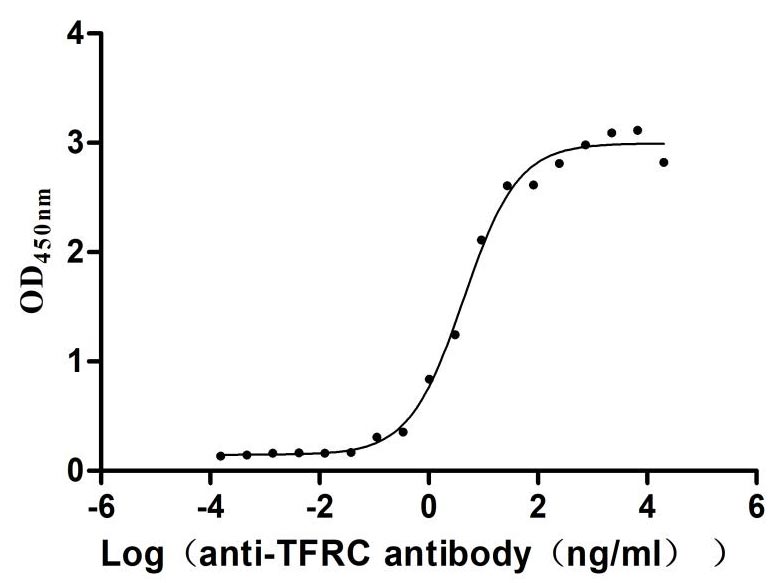Recombinant Human C-X-C motif chemokine 9 protein (CXCL9)
In Stock产品详情
-
纯度:>97% as determined by SDS-PAGE.
-
内毒素:Less than 1.0 EU/μg as determined by LAL method.
-
生物活性:Fully biologically active when compared to standard. The biological activity determined by a chemotaxis bioassay using human peripheral blood T-lymphocytes is in a concentration range of 10- 100 ng/ml.
-
基因名:
-
Uniprot No.:
-
别名:C-X-C motif chemokine 9; chemokine (C-X-C motif) ligand 9; CMK; crg-10; CXCL9; CXCL9_HUMAN; gamma interferon induced monokine; Gamma-interferon-induced monokine; HuMIG; MIG; monokine induced by gamma interferon; monokine induced by interferon gamma; Monokine induced by interferon-gamma; SCYB9; Small inducible cytokine B9; small inducible cytokine subfamily B member 9; Small-inducible cytokine B9
-
种属:Homo sapiens (Human)
-
蛋白长度:Full Length of Mature Protein
-
来源:E.Coli
-
分子量:11.7 kDa
-
表达区域:23-125aa
-
氨基酸序列TPVVRKGRCS CISTNQGTIH LQSLKDLKQF APSPSCEKIE IIATLKNGVQ TCLNPDSADV KELIKKWEKQ VSQKKKQKNG KKHQKKKVLK VRKSQRSRQK KTT
-
蛋白标签:Tag-Free
-
产品提供形式:Liquid or Lyophilized powder
Note: We will preferentially ship the format that we have in stock, however, if you have any special requirement for the format, please remark your requirement when placing the order, we will prepare according to your demand. -
缓冲液:Lyophilized from a 0.2 μm filtered concentrated solution in 20 mM PB, pH 7.4, 50 mM NaCl.
-
储存条件:Store at -20°C/-80°C upon receipt, aliquoting is necessary for mutiple use. Avoid repeated freeze-thaw cycles.
-
保质期:The shelf life is related to many factors, storage state, buffer ingredients, storage temperature and the stability of the protein itself.
Generally, the shelf life of liquid form is 6 months at -20°C/-80°C. The shelf life of lyophilized form is 12 months at -20°C/-80°C. -
货期:5-10 business days
-
Datasheet & COA:Please contact us to get it.
相关产品
靶点详情
-
功能:Cytokine that affects the growth, movement, or activation state of cells that participate in immune and inflammatory response. Chemotactic for activated T-cells. Binds to CXCR3.
-
基因功能参考文献:
- CXC chemokine ligand 9 promotes the progression of diffuse large B-cell lymphoma in a beta-catenin-dependent manner. PMID: 30130730
- CXCL9 level was significantly higher in alopecia areata patients compared with controls and with vitiligo patients PMID: 27863059
- CXCL9 may promote prostate cancer progression via inhibition of cytokines from T cells. PMID: 29901197
- High CXCL9 expression is associated with invasion and metastasis in tongue squamous cell carcinoma. PMID: 29286143
- MIG low in the tumor microenvironment can be used as potential indicators for the progression of non-small cell lung cancer PMID: 28375674
- the results of the current study revealed increased serum levels of MIG as a novel independent marker of poor prognosis in newly diagnosed patients with MM. PMID: 26999330
- High CXCL9 expression is associated with clear-cell renal cell carcinoma. PMID: 26910919
- Circulating CXCL9 serum levels are high in chronic Q fever patients and is a promising biomarker for the diagnosis of chronic Q fever. PMID: 28793883
- High urine CXCL9 level is associated with acute rejection in Histologically Stable Kidney transplant Recipients. PMID: 26694099
- CXCL9 expression in lesional macrophages implicates the skin as the source of circulating cytokines. CXCL9 is a promising biomarker of disease activity in morphea. PMID: 28450066
- significant correlation between serum levels and the severity of coronary artery disease, quantified by the Gensini score PMID: 28100872
- High CXCL9 plasma levels favour response to pegIFN alpha 2a and ribavirin in hepatitis C virus infected patients regardless of DPP4 activity. PMID: 26344576
- CXCL9 is a useful predictor of better clinical outcome in colorectal cancer patients. PMID: 26898419
- The mRNA expression and serum levels of CXCL9 were both increased. PMID: 26828996
- Data show that asymptomatic patients with unstable plaques exhibited higher levels of endothelial microparticles (EMPs), CXCL9 chemokine and stem cell growth factor; lymphocyte secreted C-type lectin (SCGF-beta) compared to those with stable plaques. PMID: 26564003
- congruent with the concept that inflammation plays a key role in the pathogenesis of LV dysfunction, MIG, IP10 and I-TAC add diagnostic accuracy over and beyond NT-pro BNP. PMID: 26506526
- Suggest that CD44 and CXCL9 may serve as predictive biomarkers to identify liver allograft recipients at risk for clinically significant acute graft rejection. PMID: 25950774
- Knock-down of CD44 resulted in an upregulation of mRNA expression of the chemokines CXCL9 and CXCL12, as well as their receptors CXCR3 and CXCR4. PMID: 24614402
- There were no significant differences in distribution of CXCL9 genotypes and alleles between rheumatoid arthritis patients and control group. PMID: 25702175
- This work confirms that OPN, CCL5 and CXCL9 plasma levels are higher in psoriasis patients and provides evidence that their higher levels are not a consequence of obesity. PMID: 25972108
- This inhibitory action of resveratrol was also observed for the cytokines-induced expression of chemokines CXCL9, CCL2 and CCL5. PMID: 25890876
- This paper suggests a role for Epithelial to mesenchymal cell transition in the pathogenesis of idiopathic pulmonary fibrosis and provides a novel mechanism for the inhibitory effects of CXCL9 on TGF-beta1-induced Epithelial to mesenchymal cell transition. PMID: 26268659
- The expression of TNF-alpha and CXCL9 in blood samples stimulated with a bacterial antigen distinguishes active tuberculosis patients from latent disease carriers and healthy controls. PMID: 25528189
- CXCL9 inhibits the proliferation of epithelial cells via phosphorylation of p70S6K, resulting in the excretion of TGF-beta as downstream mediator. CXCL9/CXCR3 interaction can exacerbate antineoplastic agent-induced intestinal damage. PMID: 25398650
- CXCL9 is involved in the invasion ability of hepatocellular carcinoma cells possibly through up-regulation of its potential effector PREX2. PMID: 25151370
- both bactericidal and cell-recruiting activities of MIG/CXCL9 are corrupted by P. aeruginosa through release of elastase, and this may contribute to impaired airway host defense in CF. PMID: 25115612
- Elevated IL-2R, IL-1RA, and CXCL9 are associated with shorter event-free survival in newly diagnosed follicular lymphoma, treated with chemoimmunotherapy. PMID: 25422100
- CXCL9 expression was low in control skin, mild in perilesional skin from slowly progressive vitiligo and high in progressive vitiligo. Such expression was found in the epidermal as well as the dermal infiltrate. PMID: 24438589
- study demonstrated that CXCL9 is associated with tumor burden and aggressiveness of NPC tumors and the serum level of this ligand may be useful as a prognostic indicator PMID: 24278236
- Higher circulating levels of CXCL-9 and -11 have been shown in non-pregnant autoimmune thyroiditis patients with a history of recurrent abortion as compared to both control groups PMID: 24351073
- In this study of human cryoglobulinemic glomerulonephritis we showed a striking expression of cytokine CXCL9, a classical macrophage activation marker, by the macrophages and possibly other cell types within the glomeruli. PMID: 24084359
- High urinary CXCL9 is associated with kidney transplant injury. PMID: 23968332
- CXCL9 associated with sustained virological response in chronic hepatitis B patients receiving peginterferon alfa-2a therapy. PMID: 24124595
- Plasma concentrations of CXCL9 are elevated at the onset of chronic graft-versus-host disease diagnosis, but not in patients with chronic graft-versus-host disease for more than 3 months. PMID: 24363401
- Collectively, our results show that a diverse milieu of chemokines is expressed in myocardium and valvular tissue lesions and emphasize the role of CXCL9/Mig in mediating T cell recruitment to the site of inflammation in the heart. PMID: 23417848
- Our study demonstrated that CXCL9 is associated with tumor burden and aggressiveness of OSCC tumors and serum level of this ligand may be useful as a prognostic indicator PMID: 23769451
- CXCL9 was increased in lung transplant lavage fluid during diffuse alveolar damage, acute rejection, and lymphocytic bronchiolitis. Elevated CXCL9 was associated with increased risk of chronic allograft dysfunction. PMID: 24063316
- Our study demonstrates in mixed cryoglobulinemia and hepatitis C vs controls: (i)high serum CXCL9 and CXCL11, significantly associated with the presence of active vasculitis; (ii) a strong relationship between circulating CXCL9 and CXCL11 PMID: 23527708
- The secretion of CXCL9 by activated T cells is also increasingly downregulated with increasing concentrations of bortezomib. PMID: 23179902
- Report high serum levels of CXCL9/TNF-alpha/interferon-gamma in patients with mixed cryoglobulinaemia and chronic hepatitis C. PMID: 22766105
- Intragraft CXCL9 mRNA has a functionally important role in T-cell activation in liver allograft and serves as biomarker for acute cellular rejection. PMID: 22889476
- CXCL9 is localized predominantly in the cytoplasm of breast cancer cells and prostaglandin E2 inhibits cytokine induced CXCL9 secretion. PMID: 22333315
- Malaria-infected primigravidae with placental CXCL9 levels in the lowest tertile gave birth to babies who weighed 610 g more than babies born to mothers with high CXCL9 levels. PMID: 22689822
- Elevated plasma levels of MIG are associated with inflammatory bowel disease with JCV infection. PMID: 22467521
- HSV-2 induces CXCL9 expression in human cervical epithelial cells by activation of p38-C/EBP-beta pathway PMID: 22586042
- Autophagy may be a crucial intracellular mechanism of Mig induction in response to HBV infection. PMID: 22580676
- Immunohistochemically, the lining synovium of Rheumatoid Aarthritis clearly expressed CXCL9 PMID: 22401175
- Elevated plasma levels of interferon-gamma and Cys-X-Cys chemokine receptor 3-binding chemokine CXCL9 are present in patients with thoracic aortic aneurysms. PMID: 21962843
- We found that urine CXCL9 and CXCL10 were markedly elevated in adults and children experiencing either AR or BKI (p = 0.0002), but not in stable allograft recipients PMID: 21812928
- We first show that circulating CXCL9 and CXCL11 are increased in patients with thyroiditis and hypothyroidism and are related to each other. PMID: 21470996
显示更多
收起更多
-
亚细胞定位:Secreted.
-
蛋白家族:Intercrine alpha (chemokine CxC) family
-
数据库链接:
HGNC: 7098
OMIM: 601704
KEGG: hsa:4283
STRING: 9606.ENSP00000354901
UniGene: Hs.77367
Most popular with customers
-
Recombinant Human Angiotensin-converting enzyme 2 (ACE2), partial (Active)
Express system: Mammalian cell
Species: Homo sapiens (Human)
-
Recombinant Paguma larvata Angiotensin-converting enzyme 2 (ACE2), partial (Active)
Express system: Mammalian cell
Species: Paguma larvata (Masked palm civet)
-
Recombinant Human Claudin-18.2 (CLDN18.2)-VLPs (Active)
Express system: Mammalian cell
Species: Homo sapiens (Human)
-
Recombinant Rabbit Tissue factor pathway inhibitor (TFPI) (Active)
Express system: Mammalian cell
Species: Oryctolagus cuniculus (Rabbit)
-
Recombinant Mouse Transthyretin (Ttr) (Active)
Express system: Mammalian cell
Species: Mus musculus (Mouse)
-
Recombinant Human Claudin-9 (CLDN9)-VLPs (Active)
Express system: Mammalian cell
Species: Homo sapiens (Human)
-
Recombinant Human Claudin-6 (CLDN6)-VLPs, Fluorescent (Active)
Express system: Mammalian cell
Species: Homo sapiens (Human)
-
Recombinant Human Transferrin receptor protein 1 (TFRC), partial (Active)
Express system: Mammalian cell
Species: Homo sapiens (Human)

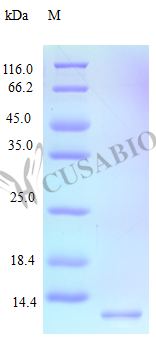

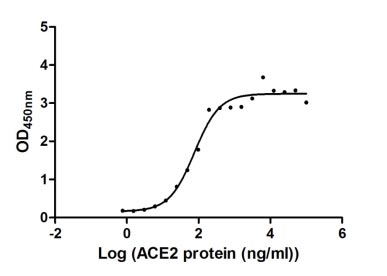
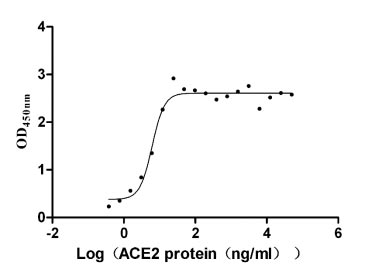
-AC1.jpg)
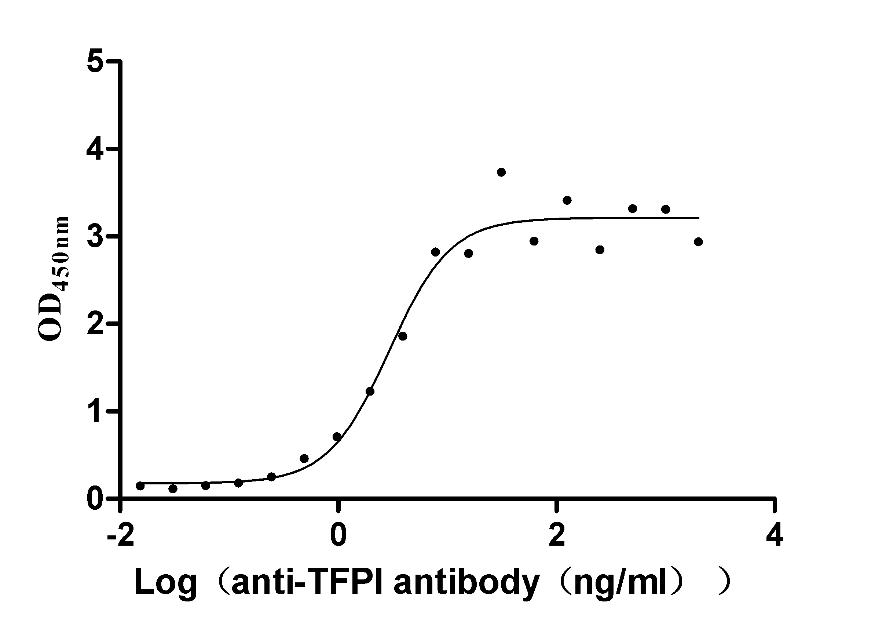
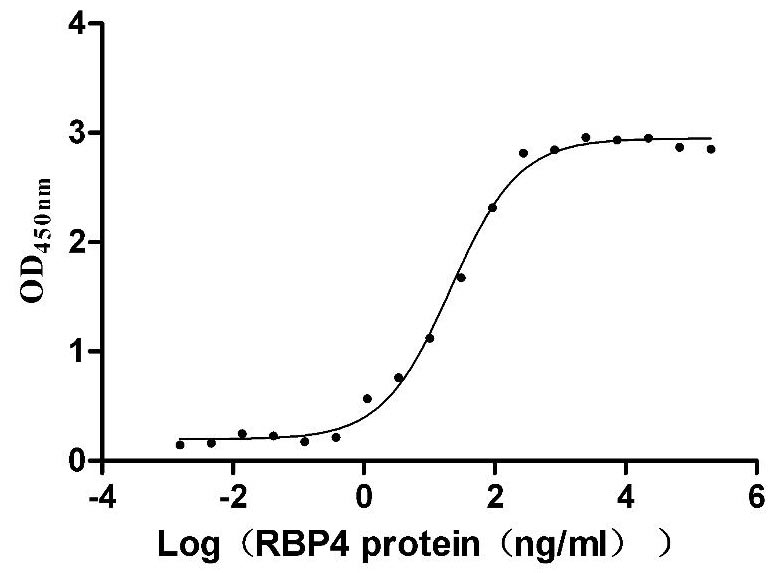
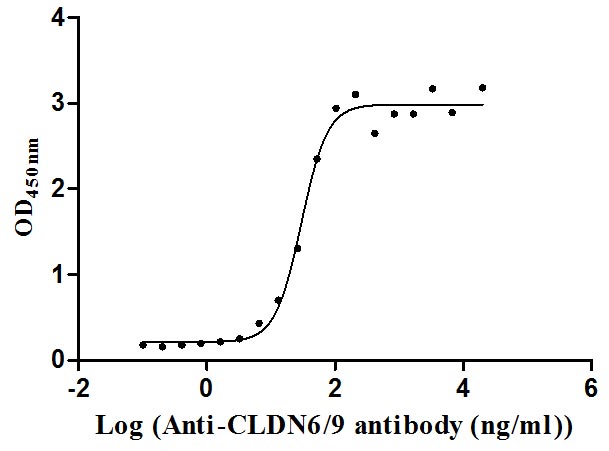
f4-AC1.jpg)
